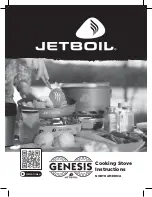
-
The flue must be in good condition and must provide
sufficient draught.
-
The flue must be suitable for the installation of solid
fuel burning appliances and comply with Current
Building Regulations.
-
The flue must be clean. It should be swept to remove
soot and dislodge tar deposits.
-
The flue must be well insulated. If the flue inner wall
surfaces are cold, a good thermal draw is impossible
causing condensation problems (tar formation etc) to
occur.
-
The flue must not be shared with other appliances.
-
The chimney must be at least 4.5 m (15 ft high).
-
In case of a flat roof or when the roof gradient is lower
than 15°, the stack must be 1,2 m (4 feet) high at least.
-
If the chimney has any down draught tendency, due to
its position in relation to nearby obstacles, then an
anti-down draught cowl must be installed on the
chimney or the chimney height must be increased.
-
If the decompression in the chimney is excessive, a
draught stabiliser must be installed.
Chimney to be built / New flue
: The chimney must
comply with Current Building Regulations. If in doubt,
consult your Dealer or local Building Inspector.
-
The appliance must not support the weight of the flue.
-
It must be distant from any combustible material
(walls, cross members).
-
It must permit an easy sweeping.
2.4 Mounting the flue collar
The stove is supplied with a connection flue spigot with
an inner diameter of 125 mm and an outer diameter of
139 mm. The stove is set from the factory with a top
outlet.
2.5 Top flue outlet
Figure 3
-
First remove the flue baffle (
A
).
-
The stove is set from the factory with a top outlet.
-
Do not remove the cast iron top.
-
Fit the sealing rope (
B
) in the groove and attach the
flue spigot (
C
) on the top using the bolts and washers
supplied, ensuring there is a good seal.
-
Refit the flue baffle (
A
).
2.6 Rear flue outlet
Figure 4
-
Do not remove the cast iron top.
-
remove the cardboard chock from the top.
-
Remove the internal baffle
A
.
-
Remove the rear heat shield
F
.
-
Remove the flue precut part in the heat shield
(figure 5).
-
Removed the flue spigot
C
.
-
Place the seal rope
B
within the groove, fix the
blanking plate
D
and the clamp
E
and ensure a good
tightness.
-
Place the seal rope
B
within the groove, screw into
position the Flue collar
C
and ensure a good tightness.
-
Replace the rear heat shield
F
.
-
Refit the flue baffle
A
.
Technical manual “1274”
5
“SAVOY MK2” - model : 134 08 09
Installation instruction
1
2
A
A
B
C
Figure 3 - Top flue outlet
1
2
A
A
B
C
B
D
E
F
Figure 4 - Rear flue outlet
Figure 5 - Cut-out in the rear heat shield
A
- Flue baffle
B
- Gasket
C
- Flue collar
D
- Blanking plate
E
- Clamp
F
- Back panel
































